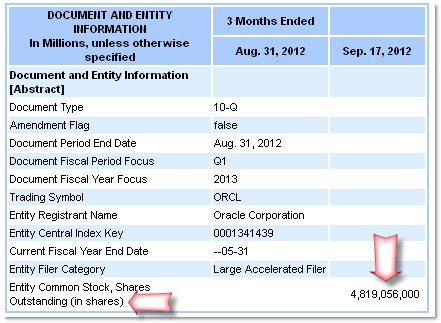Oracle isn't worth more than every other company in the world combined, and why XBRL isn't foolproof
Written by Jason on December 13, 2012We've been looking at XBRL for the last few weeks for the purposes of trying to capture some specific financial data from SEC filers. Getting data is reasonably straightforward. The challenge is getting consistently reliable data. Unfortunately for our purposes, commercial data vendors aren't providing all of the items that we find interesting.
We've made some progress, and are getting close to having something that is useful. But as with any large data collection, when thousands of different organizations are contributing to it, there are many different ways of doing things. And some things just slip through the cracks, like miskeyed dates (October 1st, 2012 entered as January 10th, 2012).
As an illustration of this, we're going to highlight an error from Oracle.
It's a great company, don't get us wrong, but it's not worth over 100 QUADRILLION dollars (that's a million billion dollars). Unfortunately, a blind reading of their most recent machine-readable XBRL quarterly filing with the SEC would leave you with that impression.
Using the XBRL viewer on sec.gov, everything looks reasonable with the summary page showing ~4.8 billion shares outstanding.

The XBRL filing is a different story though, where it's showing ~4.8 quadrillion shares outstanding. Multiply those 4.8 quadrillion shares by a share price in the low $30s as of this writing, and you're looking at a market cap of well over 100 quadrillion dollars.

In case you're wondering what the "decimals" attribute is used for, per the SEC's definition, it's "used to express the number of decimal places to which numbers have been rounded." This is not the same as saying the number should have a decimal place 6 spots to the left of where it actually is.
Whose software let this pass? Oracle's.

We don't mean to single out Oracle here. There are at least ten other companies that have the same error in the most recent quarter (we stopped counting at ten), and they're using software from three different vendors (none of them use Oracle). It's just that when the vendor of the software that made the filing has an error like this, it tells us that the tools themselves may be obscuring the actual data being represented in the name of making it easier for the human users. Most people we know don't want to see a 10 or 16 digit number with a lot of zeros at the end when you can round them to the thousands, millions, or even billions.
Also, it's extremely difficult to teach a computer to validate data against what humans would consider to be common sense. This is a computer science problem that is by no means limited to XBRL.
We're glad that XBRL is here, and that it's being used by SEC filers. We're just looking forward to the day where there won't be a need to do any sanity checks on the filings.
As a final note, until you spend a lot of time looking at raw data files, it's hard to fully appreciate the service that data aggregators (both commercial and government) provide when they scrub their numbers before distribution.
Sources:
Oracle XBRL filing using SEC viewer:
http://www.sec.gov/cgi-bin/viewer?action=view&cik=1341439&accession_number=0001193125-12-401697&xbrl_type=v
Oracle XBRL filing:
http://www.sec.gov/Archives/edgar/data/1341439/000119312512401697/orcl-20120831.xml


